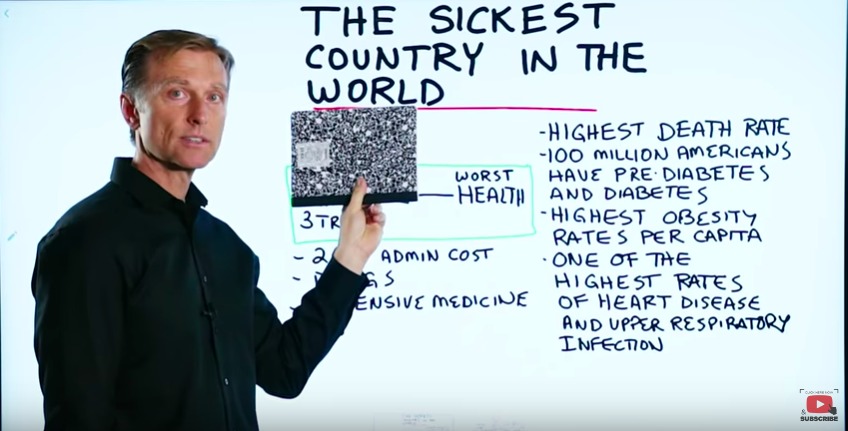Metabo Law
Most people don't know and don't care that they are at the bottom of industrialized nations in many areas, including health. It is VERY difficult to get around it unless you spend a lot of money and time preparing or growing your own food. Health care is reactionary/emergency focused and not proactive/preventative. Many people believe that Doctors earn too much money and that drugs are too expensive especially in the USA, compared to other nations. The general population is far too sedentary, driving everywhere, working too much, and not having a healthy work-life balance.
What Is The Sickest Country In The World (click below)

So....what's it all about?
It's all about the money. There's no money in the cure; the money's in the treatment. Also, I've learned that sugar we consume is at the heart of this health problem. Of course, nobody is telling us about that because if they did, a lot of their income would disappear. The good news, people are now starting to figure that out.
What is Metabo law?

Japan is known to have one of the lowest rates of obesity in the world. A traditional diet of fish, vegetables, and rice combined with an urban culture of walking and high levels of public transport usage have helped the Japanese avoid the fate of other Western nations that are today in the grip of the global obesity epidemic. As Japan adopts a diet of processed foods, its obesity levels are projected to rise. This would amount to a public health problem the Japanese government can’t afford.
What is Metabo Law?
In 2008 the Japanese Ministry of Health, Labour, and Welfare introduced the ‘Metabo Law,’ which requires men and women between the ages of 40 and 74 to have their waist circumference measured annually. The waistline circumference limits are 33.5 inches for men and 35.4 inches for women. In addition, companies’ health insurers are required to provide weight loss classes to employees that have become overweight or met certain other criteria. The government imposes fines on companies and local governments that do not meet specific targets. Personal computer company NEC noted that these fines could amount to US$19 million for a large business.
Why does Japan need the Metabo Law?
While this strategy has its critics, the Japanese government has demonstrated a willingness to be on the front foot when meeting the challenge of obesity. The government’s greatest concern is for the health of its people and to prevent diseases such as type 2 diabetes from reaching epidemic levels. The government is also deeply concerned about the huge costs involved in funding Japan’s (increasing) aging population who typically receive health care from the State or their employer. Japan also has low fertility rates meaning that the pool of younger taxpaying citizens is diminishing.
Should the government intervene in waistlines?
While many in the West would balk at the suggestion the government should measure their waistlines, many Japanese enjoy attending exercise classes and dance to ‘Metabo’ music with lyrics such as “Goodbye, metabolic. Don’t wait till you get sick. No! No! No!”. By reframing excess weight as ‘Metabo’ rather than obesity, people seem to be less offended and more likely to engage, possibly because nobody wants to wind up with the downstream illnesses such as blindness or limb amputation. The message centers on prevention. Interestingly, eating disorders have increased significantly in Japan since the 1980s. However, numbers are still low by typical Western standards. Might the ‘Metabo’ phenomenon exacerbate an eating disorder problem? Only time will tell as the Generation Y and Millennials ‘age’ and enter the 40-year-old threshold at which Metabo waistline measurements become necessary and pressure to maintain a certain weight is felt.
The health of the next generation is now at stake.
While many may not agree with Japan’s paternalistic strategy for obesity management, whether it proves effective in the long run, is still a work in progress. Meanwhile, in Western liberal democracies, governments struggle amid ‘Nanny State’ accusations, to pass sugar taxes for fear of upsetting consumers and industry. Obesity can’t freely be discussed for fear of accusations of fat-shaming or possible promotion of eating disorders. This places those who are trying to address the serious health risks of the problem between a rock and a hard place – ultimately, nobody wins, and the problem gets worse. Perhaps consumer education about the health risks associated with modern food combined with a healthy food culture from childhood is one option everyone can agree on.
After all, the health of the next generation is now heavily at stake.
Author - Louise Stephen
Donald Grandy
Sport & Nutrition Coach
dongrandy@gmail.com
*This content is strictly for informational and educational purposes only. It is not intended to provide medical advice or to take the place of medical advice or treatment from a personal physician. All viewers of this content are advised to consult their doctors or qualified health professionals regarding specific health questions. All viewers of this content, especially those taking prescription or over-the-counter medications, should consult their physicians before beginning any lifestyle program.
Articles from Donald 🐝 Grandy PN
View blog
Noble Samurai is an organization dedicated to developing and improving all elements of the market re ...

Noble Samurai is an organization dedicated to developing and improving all elements of the market re ...

Kitchen Makeover No… This Is Not A Reno! · Yes-A kitchen makeover gets rid of the non-nutritious stu ...
Related professionals
You may be interested in these jobs
-
Law Clerk
1 week ago
Gill Basi Brar Personal Injury Law Brampton, OntarioGill Basi Brar Injury Law is seeking a Junior Law Clerk with 1-3 years of experience in accident benefits to join our team. · ...
-
Law Clerk
1 month ago
Insight Global Toronto, Ontario+Insight Global is seeking an experienced Senior Law Clerk to join our litigation team. · Drafting finalizing and filing pleadings and motion materials. · Preparing Affidavits of Documents. · Preparing for examinations for discovery applications and trial. · Arranging court filin ...
-
Corporate Law Clerk
6 days ago
Minted Search Group TorontoA well-established mid-sized/boutique law firm in Midtown Toronto is seeking a Corporate Law Clerk with 10+ years of experience to join its busy corporate practice.This is a fully in-office position. · ...


Comments
Joyce 🐝 Bowen Brand Ambassador @ beBee
5 years ago#3
Joyce 🐝 Bowen Brand Ambassador @ beBee
5 years ago#2
Jerry Fletcher
6 years ago#1